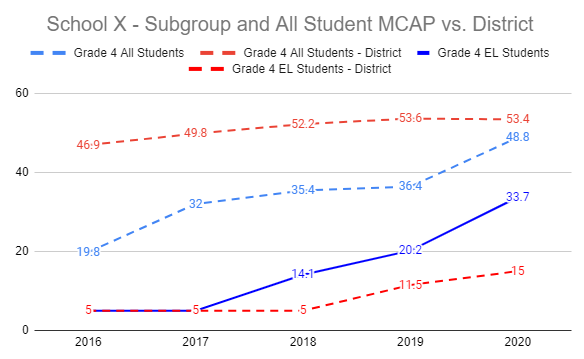It's budget season which means we are looking closely at costs for next year. If you are reeling from sticker shock after speaking to your vendor partners, take solace that you are not alone.
Read MoreOur student data team partnered with the Maryland Alliance of Public Charter Schools to develop a series of webinars and accompanying tools aimed at supporting school leaders in identifying and effectively communicating their school’s success story using data.
Read MoreIn our work of conducting finance function assessments, we’ve found it’s often hard for school Boards and others who don’t work every day on school finance to accurately gauge the health of a school’s financials and finance office. To help with that conundrum, we have developed a quick EdOps School Financial Health Self Assessment that identifies the most important financial metrics and best practices.
Read MoreOur Consulting Team recently helped a nonprofit education organization strengthen its finance function. While EdOps concentrates exclusively on supporting schools and therefore couldn’t take on this client for monthly finance support, we helped the organization find a financial services vendor that suited its needs.
Read MoreIf you are like many school leaders right now, you are both excited to access all the COVID stimulus available, but also a little anxious about how best to utilize this funding. You are hoping the funds will help you (1) maintain your program in the near-term with all of the demands of a pandemic environment while also (2) maintaining financial sustainability after the funds wind down. You are not alone and we are here to help you think about a plan for allocating these resources. This blog post will give an overview of the funding available and a step-by-step process for building COVID grant budgets.
Read MoreGood financial reports are a school CFO’s most undervalued tool. When EdOps performs a school finance function assessment, we routinely find that the challenges we uncover are caused not by ineffective staff or bad software, but by an absence of clear, concise, understandable, and agreed-upon financial reports. Too often, the financials boards receive are simply a PDF printout of a year-to-date income statement from the school’s accounting system. While this meets the minimum bar of keeping the board apprised of the school’s financial position, good financial reports tell a story. They are tailored to their audience, and they explain not just the “what” but the “so what.” At the board level, good financial reports enable robust discussion of financial options, even from board members without a financial background; they provide an accurate picture of the financials prior to the annual audit; and they lead to faster, more strategic decision making.
Read MoreAs we prepare for an unusual start to the school year, we are striving to make staff feel like valued members of our communities. One element towards that is having routine operations running smoothly so that attention can be focused on the students and their learning experience. Payroll is a predictable element of running a school that, if done well, is hardly thought about by staff – except maybe on pay day! Payroll mistakes, however, can be upsetting, stressful, and take up a lot of administrative time and energy to rectify. This is the first in a series with tips on how to process an error-free payroll based on our extensive payroll experiences with schools. We hope these will be helpful in increasing the accuracy of your payroll.
Read MoreAs we prepare for an unusual start to the school year, we are striving to make staff feel like valued members of our communities. One element towards that is having routine operations running smoothly so that attention can be focused on the students and their learning experience. Payroll is a predictable element of running a school that, if done well, is hardly thought about by staff – except maybe on pay day! Payroll mistakes, however, can be upsetting, stressful, and take up a lot of administrative time and energy to rectify. This is the first in a series with tips on how to process an error-free payroll based on our extensive payroll experiences with schools. We hope these will be helpful in increasing the accuracy of your payroll.
Read MoreAs we prepare for an unusual start to the school year, we are striving to make staff feel like valued members of our communities. One element towards that is having routine operations running smoothly so that attention can be focused on the students and their learning experience. Payroll is a predictable element of running a school that, if done well, is hardly thought about by staff – except maybe on pay day! Payroll mistakes, however, can be upsetting, stressful, and take up a lot of administrative time and energy to rectify. This is the first in a series with tips on how to process an error-free payroll based on our extensive payroll experiences with schools. We hope these will be helpful in increasing the accuracy of your payroll.
Read MoreAs we prepare for an unusual start to the school year, we are striving to make staff feel like valued members of our communities. One element towards that is having routine operations running smoothly so that attention can be focused on the students and their learning experience. Payroll is a predictable element of running a school that, if done well, is hardly thought about by staff – except maybe on pay day! Payroll mistakes, however, can be upsetting, stressful, and take up a lot of administrative time and energy to rectify. This is the first in a series with tips on how to process an error-free payroll based on our extensive payroll experiences with schools. We hope these will be helpful in increasing the accuracy of your payroll.
Read MoreAs we prepare for an unusual start to the school year, we are striving to make staff feel like valued members of our communities. One element towards that is having routine operations running smoothly so that attention can be focused on the students and their learning experience. Payroll is a predictable element of running a school that, if done well, is hardly thought about by staff – except maybe on pay day! Payroll mistakes, however, can be upsetting, stressful, and take up a lot of administrative time and energy to rectify. This is the first in a series with tips on how to process an error-free payroll based on our extensive payroll experiences with schools. We hope these will be helpful in increasing the accuracy of your payroll.
Read MorePlanning for how to address the COVID slide, or even a COVID slowdown, is challenging given the undefined path of the next few months, but one thing that is certain is that data will play a more critical role than ever in efficiently and effectively planning to make up for lost time and learning. The key questions many are looking to answer – which data to use, when to collect the data, and what to do with the data. While no consensus has been reached, a number of ideas and strategies are emerging that capture how schools plan to use current and future data to attack this learning slide.
Read MoreOn April 15, EdOps published “Budget Considerations from COVID-19,” detailing planning considerations that LEAs might apply to their contexts when budgeting for SY20-21. This post is a follow-up to share the planning efforts of specific LEAs on DC’s Deputy Mayor for Education’s Contingency Education Budget Planning Response Work Group. The intention of this post is to facilitate knowledge sharing among public charter school LEAs as they prepare their SY20-21 budgets.
Read MoreA successful first day of school begins months before the first day of classes. Schools with strong data practices typically begin initial Student Information System (SIS) planning and preparation during the spring of the prior school year. A staff member or team coordinates the completion of major tasks so that the student information system is ready for use by the first day of school. We recommend this sample timeline to get you started and highlight four things that can derail these plans.
Read MoreThe Finance Committee leads the Board of Directors in performing its fiduciary duty to the nonprofit organization that runs the school. There are a number of key responsibilities that a Finance Committee must complete to support the school staff and the full board in their work.
Read MoreThis the second of our two-part series on best practices in board governance over academic performance. Part 1 focused on the responsibilities of an academic performance committee and the importance of creating a calendar around reviews of school performance. In this post, we delve further into how strong boards review school performance, as well as common metrics and visualizations that can help boards easily understand their student performance data. A board’s goal should look for ways to understand the trends in academic performance throughout the year, not just in a once-per-year snapshot when state assessment results are published.
Read MoreMuch is unknown about the impact or the duration of the COVID-19 crisis. In coordination with the D.C. Deputy Mayor for Education’s Contingency Education Budget Planning Response Work Group, EdOps led the development of potential revenue and expense implications the pandemic may have on local education agency (LEA) budgets. LEAs are encouraged to apply these considerations to their contexts.
Read MoreAs recommended by Education Board Partners in Standards for Effective Charter School Governance, the top priority of effective boards should be to ‘focus relentlessly on student achievement.’ Schools are in the business of providing top-notch education to students, and school boards should prioritize this principle in their work.
Read MoreA personnel file audit is the periodic and systematic review of your personnel files to assess whether the documents in each employee’s personnel file are accurate, up to date, and complete. The audit helps ensure legal compliance, identifies HR process weaknesses and highlights HR successes.
Read More













